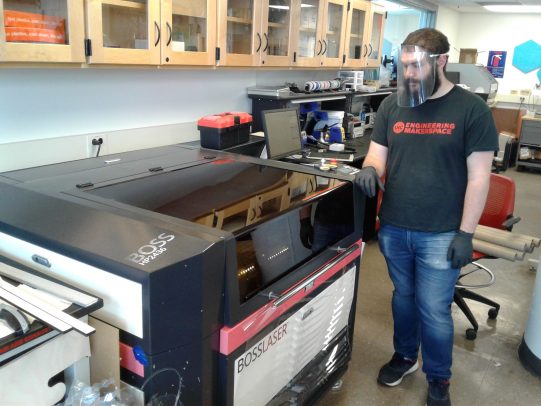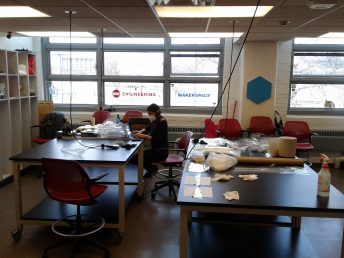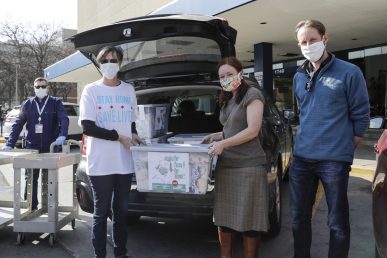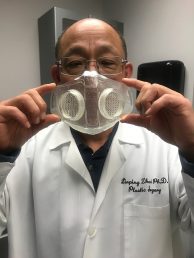UIC’s campus-wide COVID-19 efforts

The University of Illinois at Chicago is working on a host of projects with a mission to assist patients, health care providers and first-responders as they treat people with COVID-19 and prevent the further spread of the virus.
The UIC Innovation in COVID-19 Working Group (ICWG) was formed under the auspices of Dr. Mark Rosenblatt, dean of the College of Medicine, who recognized the power of uniting the creative resources spread among various colleges in UIC’s response to the pandemic.
“UIC has a strong legacy of public-serving research and innovation, which makes us well-positioned to brainstorm and advance interdisciplinary solutions,” Rosenblatt said. “Our faculty, staff and researchers from across campus responded immediately to the call to organize and collaborate to address the various and complex challenges posed by the pandemic.”
The ICWG was organized at UIC to assign resources to and manage COVID-19 medical-related projects, said Peter Pfanner, executive director of the UIC Innovation Center. Pfanner co-leads the working group with Dr. Yannek Leiderman, associate professor of ophthalmology, who also helped organize the group.

The UIC Innovation Center works with major corporations and nonprofits, including OSF Healthcare, Caterpillar, City Tech, and Intuitive Surgical, and runs internally funded medical R&D labs, which focus on urology, ophthalmology and medical device development. The internal medical labs shifted focus to COVID-19 related activities to support the needs of UI Health — UIC’s academic and clinical health enterprise —and the College of Medicine and to potentially bring new health care products to the marketplace.
The interdisciplinary projects are being coordinated and worked on through the Innovation Center in partnership with many different colleges at UIC, including the College of Medicine; the College of Engineering; the College of Architecture, Design, and the Arts (CADA), and the College of Nursing. This collaboration brings together centers of innovation across the university with stakeholders at the medical center.
The ICWG is in constant communication with various colleges on campus, officials from UI Health and others on the front lines of treatment. Health care providers were invited to team up with designers and engineers in order to rapidly come up with solutions, said Leiderman, a biomedical device researcher and retinal surgeon who leads the Vitreoretinal Microsurgery Laboratory and the clinical imaging division in the department of ophthalmology and visual sciences.
“The greatest unmet need has been protecting frontline providers,” Leiderman said. “If you’re a doctor, a nurse or other health professional treating a patient in respiratory distress related to COVID-19, the types of procedures and life-saving treatments that are performed may place the whole provider team at risk.”
The projects include:
Face Masks: A need became apparent after Illinois advised all residents to wear masks when they leave home, and UI Health adopted universal masking of all patients, visitors and staff in its hospital and clinics to minimize spreading the infection to others, including health care providers. Knowing that demand would rapidly outstrip commercial supplies, CADA came up with a design for a reusable mask and partnered with costume designers with the Chicago Shakespeare Theater to fabricate thousands of masks that were later provided to UI Health. The project, which is being funded by UIC’s leadership, was the idea of CADA Dean Rebecca Rugg and has distributed 50,000 masks to date.

“The live arts were immediately hit hard by this pandemic,” Rugg said. “Places, where people gather, became a public health hazard, so productions and theaters were closed, and some nonprofits have needed to lay people off. This felt like a way to help the health system and help the unexpectedly unemployed fabricators in the theater industry.”
Face Shields: In addition to face masks, the group came up with a design for a face shield to cover the face and neck area from saliva and other droplets from patients who are potentially infectious. This type of protection became the optimal second-line of defense but also is becoming scarcer as the pandemic continues. The College of Engineering’s MakerSpace and UIC’s Richard and Loan Hill Department of Bioengineering teamed up to fabricate the shields and even got a local business partner to procure 1,100 feet of plastic from Atlanta and Los Angeles and deliver it directly to campus. Eric Schmidt, associate director of the MakerSpace; Dylan Lynch, the assistant director of UIC Engineering’s undergrad on-campus design and production facility; and Miiri Kotche, a clinical professor in bioengineering, were instrumental in the endeavor, which also involved the Innovation Center. The designs are also publicly available.
“I am proud of the teams that have combined expertise from across UIC to find innovative ways to contribute to the coronavirus effort,” said Peter Nelson, dean of the College of Engineering. “It’s inspiring and gratifying to know that the face shields produced in the MakerSpace have been used by health care providers in our community.”

Respirator Mask: Also known as an N95 facemask, the respirator is intended to protect the wearer from infection and is a critical element in protecting first-responders and hospital staff involved in the care of people suspected to have contracted the virus. Faculty from bioengineering, chemical engineering, and electrical and computer engineering are working together with faculty from the School of Public Health and others to make a new, improved N95 product a reality, Nelson said.
“What we designed is something that someone can make at home that is much more effective than a bandana or even a regular surgical face mask,” Leiderman said.
Test Kit Nasal Swabs: Among the major needs for COVID-19 testing is test kit nasal swabs that are used to obtain samples from patients. The Innovation Center is working on creating a new nasal swab that would fill the need and work better. Leiderman said the technical challenge is that while swab samples from patients are potentially infectious, the viral genetic material can degrade and give a negative test result if not handled properly, resulting in a so-called false-negative test. The center is currently working on a 3D-printed solution that would replace the current swabs with a more effective design that will be more sensitive, make the test procedure potentially less invasive and should lead to fewer false-negative tests.
“While we are trying to manufacture an existing design, we are also designing a swab that does a better job; in that sense, to improve the whole testing procedure and have more accurate tests come back,” Pfanner said.
Intubation Protection: Among the areas of need communicated by front-line providers was the risk of performing intubations and transporting patients within health care settings— for example from the emergency room to a hospital bed. UIC is working on a protection system that can allow multiple providers to work simultaneously over the head and upper chest area of a patient, like when a breathing tube is administered. The idea is that there will be a clear, transparent barrier through which providers can put their hands and care for the patient while being protected from potentially infectious respiratory droplets.
In addition, the center has begun working on a project that would help protect newborns from contracting the virus by airborne droplets.
“I’m really proud of the entire UIC team for banding together and the collaboration among front-line providers, doctors, nurses and others in the clinical enterprise with the innovation community at UIC,” Leiderman said. “We are united in directing our efforts and the resources of our centers of biomedical innovation to the most serious problems confronting our front-line clinical providers battling COVID-19.”
